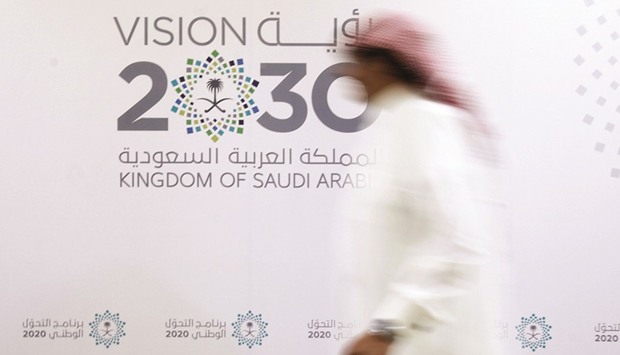Saudi Arabia may offer “almost interest-free” loans to companies in labour-intensive industries, as part of a plan to stimulate an economy squeezed by low oil prices and spending cuts, Finance Minister Mohammed al-Jadaan said.
Al-Jadaan, speaking in an interview in Washington, also said the government is on track to slash its budget deficit by 30% this year to about 200bn Saudi riyals ($53bn), and aims to finance it mainly through debt sales instead of drawing on reserves. This means the kingdom will likely tap global bond markets again this year after raising $9bn from its debut Islamic debt sale, he said.
Saudi Arabia has embarked on what it describes as an unprecedented shakeup of an economy that’s heavily reliant on oil. The Vision 2030, spearheaded by Deputy Crown Prince Mohammed bin Salman, was announced last year and includes plans to sell shares in state companies and curb government spending on subsidies and wages.
Austerity and low oil prices have led to the worst economic slowdown since the global financial crisis. The International Monetary Fund expects growth to slow to 0.4% this year from 1.4% in 2016 after the kingdom agreed on oil-output cuts with other Opec members.
“The government recognises that there is a slowdown,” al-Jadaan said. “Our projections are a little bit more optimistic than the IMF. We are targeting modest growth this year and next year.”
The Saudi plan also places a strong emphasis on creating jobs for the kingdom’s youthful population. On Thursday, Saudi authorities said that foreigners will be barred from working in shopping malls, a move expected to put 35,000 Saudis into work.
Al-Jadaan said the government will use revenue from a recovery in crude prices to support the non-oil economy, the main engine for job creation. Officials are currently in talks with private companies about government support, which would include loans to help them restructure debt, easing the impact of higher domestic energy prices as subsidies are cut. The proposal will likely be ready by the end of the second quarter, he said.
Authorities are also asking companies “what do you need from the government side, what are the issues you’re suffering in terms of licensing, procedure?” the minister said.
Saudi Arabia’s non-government economy grew just 0.1% in 2016.
Policy makers are also speeding up the approval process for projects.
“We used to review all contracts before they are signed by any government agencies if they are more than 300,000 riyals,” al-Jadaan said. “We’ve changed that to avoid unnecessary delays. It’s now 5mn, and only for more than a one-year term.”
Projects that are part of Vision 2030 and cost 100mn riyals no longer require an approval from the royal court. “They just need to notify us.”
Prince Mohammed’s plan would introduce value-added taxation, higher visa fees and a levy on expatriates, to reduce revenue-dependence on oil. Al-Jadaan said the government was “absolutely” determined to implement the VAT on January 1, 2018. Other measures are also on track, he said.
In the meantime, the government will rely on local and international bond sales to finance a narrowing budget deficit, instead of using reserves, al-Jadaan said.

A Saudi man walks past the logo of Vision 2030 in Jeddah. The kingdom has embarked on what it describes as an unprecedented shakeup of an economy that’s heavily reliant on oil.
